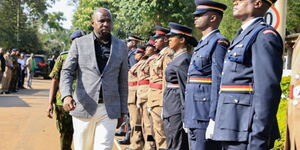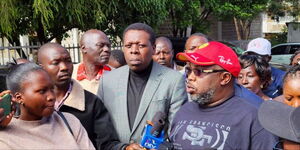Kenya Union of Post Primary Education Teachers (KUPPET) Secretary General Akelo Misori has responded to the growing wave of discontent following the sudden call-off of the teachers' strike on Monday. The decision, announced on Monday, has ignited a storm of controversy, with many educators accusing Misori of betraying their collective resolve.
As pressure mounts for his resignation, Misori insists that the decision was not his alone, but a collective one made by the union's executive board.
The teachers' strike, which had garnered widespread support from educators across the country, was abruptly halted after the Teachers Service Commission (TSC) agreed to meet certain demands. However, a section of the KUPPET leadership and many teachers on the ground have expressed outrage, accusing the union of betrayal.
"This is not just a betrayal but an affront to the collective resolve of teachers in this country," stated Samuel Orwa, the KUPPET Secretary General for Migori County, echoing the sentiment shared by many of his peers. Orwa, along with several other branch leaders, has been vocal in his criticism of how the strike was handled.
Miffat Okisai, Secretary General of the Busia branch, was equally blunt, stating, "Since the National Governing Council (NGC) had not been summoned, we want to disassociate ourselves from that pronouncement." Okisai and other leaders are adamant that the proper procedures were not followed in calling off the strike, creating a rift within the union.
Misori, however, has been quick to strike back, labelling his critics as hypocritical. He clarified that the decision to call off the strike was made after wide consultations within the executive board. According to him, the union leadership had been granted the mandate by the NGC to negotiate with the TSC and arrive at a settlement.
"The mandate we executed was not the mandate of Akelo. Akelo speaks on behalf of the executive board," Misori stated, defending the union's decision. He further explained that the executive members, who are now criticising the outcome, were the same individuals who had earlier authorised the board to negotiate with the TSC.
The division within KUPPET highlights the complexity of managing union actions, especially when dealing with issues that affect thousands of teachers nationwide. Misori expressed surprise at the sudden turn of events, stating that the very members who gave the executive board the authority to act were now accusing it of going against their will.
Despite the controversy, Misori remains steadfast. He appealed to the teachers to remain hopeful, assuring them that the union would continue to push for their demands. "We are going to pursue all the issues until every single demand is met," he reassured teachers, noting that the deal with the TSC was only a first step in a longer process.
Many teachers, however, feel that the strike was called off prematurely, and that the deal struck with the TSC failed to address their most pressing concerns. Anger has particularly been directed at the national executive board (NEB), with some branch leaders calling for its dissolution.
According to the KUPPET constitution, only the NGC has the authority to call off a strike. As per Article 22(b), any industrial action must be authorised by the NGC, and only the council can terminate it. A recent meeting of the NGC had endorsed the continuation of the strike, a decision that was expected to guide the union’s actions.
Misori’s critics argue that the NEB overstepped its mandate by unilaterally calling off the strike. A virtual meeting, proposed by Misori to review the status of the strike, was never held, further fuelling the dissatisfaction.
The cracks in KUPPET’s leadership became even more evident during the meeting with the TSC, where Edward Obwocha, the secretary for secondary schools, walked out in protest. His departure highlighted the growing discord within the union, with many members feeling that their voices were not adequately represented.
As the dust settles, it remains to be seen how KUPPET will navigate this internal crisis. With some members calling for a return to the picket lines and others urging caution, the union faces an uphill battle in restoring unity. Meanwhile, Misori has made it clear that he is not going anywhere, despite the growing calls for his resignation.
"The executive board acted within the mandate it was given. There’s no betrayal here, only the fulfilment of our duty to the teachers," he stated firmly.
For now, the union remains divided, and the fate of its leadership hangs in the balance.












